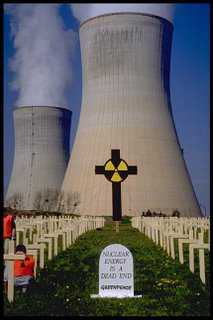
Government would soon begin consultations with the Ghana Atomic Energy Commission (GAEC) to determine how it would help generate nuclear power to supplement the hydro-electric power in order to reduce the energy crisis. Papa Owusu Ankomah, Minister of Education, Science and Sports said on Friday that a committee would be set up to look at the nuclear policy pertaining as a guide to make a firm decision to achieve the objective. Speaking on behalf of President John Agyekum Kufuor at the 40th anniversary celebration of GAEC, he said the increasing pace of development had brought with it an increase in energy consumption and that the time had come to include nuclear power in energy generation and urged the commission to take up the initiative. The anniversary, which was commemorated with a grand durbar, was attended by Ministers of State and Parliamentarians, Chiefs, staff and Directors of GAEC while the Police Band and GAEC Primary and JSS School provided music. Papa Owusu Ankomah said the GAEC was an organisation which was multi-sectoral in scope of work with activities covering health, agriculture, energy, industry, environment and education and whose research results benefited other Ministries, Departments and Agencies. "As research scientists are known to be problem-solvers through research, I have no doubt that with the current power supply problem facing the country, the scientists of GAEC are looking at ways in which we can make available alternative sources of energy to complement what we presently have." He said direct funding for research activities through budgetary allocation was limited and urged beneficiary institutions to support the Commission financially so as to continuously benefit from the results of its researchs. The Minister noted that the rate of attrition of research scientists from GAEC and other research institutions to the Universities was alarming, and said the problem was due to the relatively unattractive salaries paid them compared to the University lecturers. "It is to remedy a situation such as this that in the 2007 Budget statement presented by the Minister of Finance and Economic Planning, comprehensive pay reform features prominently." Papa Owusu-Ankomah said one principal objective of this reform was to ensure that there was equal pay for work of equal worth with the fair wages commission having oversight of all activities associated with pay administration to ensure fair wages. He said the government decided to put education and science under one Minsitry to mainstream science and technology into education and made available to as many Ghanaians as possible. He commended the Commission for its innovative programmes including the establishment of a post graduate school of Nuclear and allied sciences with the University of Ghana, the first of its kind in the sub region to build human capacity in nuclear science as a way of checking the brain drain. Professor Mike Oquaye, the MP








